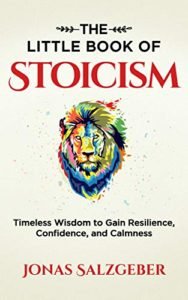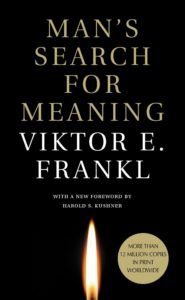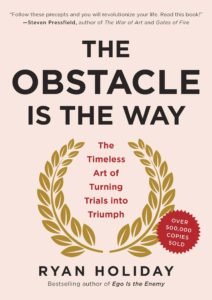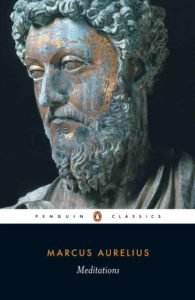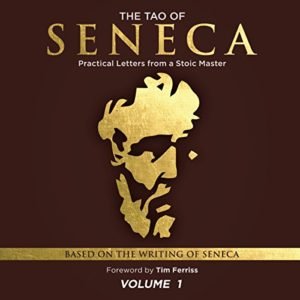One of the best ways to get into Stoicism (or anything) is through reading.
Anyone can make a YouTube Video; anyone can write a blog post.
But Books,
Books are the result of a tremendous amount of work. To get a non-fiction book published usually requires a high level of expertise and authority in a particular field.
If you are reading a Non-Fiction book, you are most likely reading a cumulation of somebody’s years of research or experience. In some cases, it could even be someone’s life’s work all distilled into one book.
There is no other format that can give you a higher return on investment of your time and money.
So in this post, we will discuss 6 Stoicism books, which I have found to be amongst some of the best. Some are ‘written’ by the master Stoics, and some are written by contemporary Stoics.
*I have read all the books on this list. There are many other books out there which I have not read. I am always reading more and will be making more posts like this in the future.
In Part 1, we will discuss the Stoic’s perspective on reading, the benefits of reading, and reading vs. audiobooks.
Part 2 is split into two categories:
- Books which are best read like a regular book
- Books which has the most to offer when you read it a chunk at a time
*If you wish to jump straight to any part of the article, click the links in the Table of Contents.
Contents
PART I – Why Read?
The Stoic’s Point of View
“Everywhere means nowhere. When a person spends all his time in foreign travel, he ends by having many acquaintances, but no friends. And the same thing must hold true of men who seek intimate acquaintance with no single author, but visit them all in a hasty and hurried manner.” – Seneca, On Discursiveness in Reading
I believe the point Seneca is trying to make here is that we shouldn’t go from one book to the next without properly soaking it in.
Reading a book just for the sake of reading it and moving onto another book straight away is like making acquaintances but no friends.
It’s crucial that when you read, you are actually attaining the knowledge and wisdom from the book.
Your primary reason for reading Stoic philosophy should be to take away actionable wisdom and make improvements in your day to day actions. (Although to read the history of Stoicism just for the sake of learning it is fine)
Stoicism is a practical philosophy, after all.
“There is nothing so efficacious that it can be helpful while it is being shifted about. And in reading of many books is distraction.” – Seneca, On Discursiveness in Reading
*Here’s a link to where the quote is from (Seneca’s Moral letters is one of the books on this list) :
Moral Letters to Lucilius/Letter 2, On Discursiveness in Reading
Why Read More Than One Stoicism Book?
Stoicism books and almost all self-help books share a common trait:
You only need to implement the advice from one of the books to completely change your life for the better.
That fact applies to Stoicism books even more because they all revolve around the same basic Stoic principles.
Which begs the question, why oh why should you read more than one book on Stoicism?
Two words:
Perspective and Reminder.
Let’s start with perspective.
This is a straight forward one, reading books from different authors gives you perspective.
Because the Stoic principles are all the same, different authors could very well have different ways of describing them. The message behind the same concept could also be subtly different from book to book.
This is good for you as it strengthens your understanding of a particular concept.
Perhaps you’re reading a book, but one of the concepts in it doesn’t make sense to you.
Then you read another book that has the same idea in it, but the author has used such a different way of explaining it that you don’t just understand the concept but resonate with it.
Now the Reminder part.
I have found that personally, if I don’t keep up with reading at least one Stoic passage a day, I would default to a non-Stoic mindset.
I don’t think this is necessary for seasoned Stoics. But before you form the habit of thinking in the Stoic way all the time (which could take years of practice), reading Stoicism is the best way to keep reminded of the Stoic way.
Any self-help obsessed person knows the saying, “You are the average of the five people you spend the most time with.”
What if you start your day spending time with Seneca? Or Marcus Aurelius?
Because of the nature of The Moral Letters by Seneca and Meditations by Marcus Aurelius; Reading them should have the accumulative effect that mimics spending time with the master Stoics in person, which would accelerate your Stoic journey.
Try it for yourself, read one moral letter from Seneca every day.
Unlike things such as meditating or working out, you will see results within days. You will find your internal monologue becoming more and more similar to Seneca’s writing.
Health Benefits
Other than the benefits of gaining ancient wisdom, reading itself also has proven health benefits:
- Reduce stress
- Lower heart rate
- Lower blood pressure
- Increase memory capacity
- Increase attention span
Audiobook VS. Reading
What about audiobooks?
There haven’t been as many studies on whether listening to audiobooks does a whole lot for your brain.
But there have been some studies done comparing the two.
So let’s do a Pros and Cons of listening to audiobooks.
(This is only from a Non-Fiction perspective)
Pros
1. Audiobooks can be listened to while you are doing other things, allowing you to get more done and ‘read’ more.
2. Audiobooks are the perfect ‘gateway drug’ to reading books.
3. Perfect for people who might find reading difficult, such as people with dyslexia, people with ADHD, people with English as their second language.
Cons
1. It has been proven that peopling remember less from Audiobooks than regular reading. As reading is a more active act.
2. Hard to take notes.
3. Hard to backtrack. You could zone out while reading and go for pages before you realize, but it’s easy to find where you lost focus and reread. But with audiobooks, once you lose focus, it could go on for much longer, and it’s way more difficult to find the point where you lost focus; Since you don’t have a physical book in front of you.
Bottom line
I love audiobooks, but as much as I try to think of advantages for them; It just all boils down to the fact that you could listen to them if your vision is occupied doing something else or if you can’t read at all.
In most cases, you are better off reading. But if you have unutilized time, such as during commute or while walking your dog, audiobooks are great.
Most adults don’t read at all, so audiobooks are a perfect middle ground.
How to Read Stoicism
Reading a non-fiction book is a lot more different from reading a novel. Especially if it’s a book about the philosophy you’re trying to practice.
Here are some tips on how to get the most out of your reading:
(*these are only guidelines to maximize your reading, not necessities.)
1. There is nothing wrong with pausing while you’re reading to contemplate what’s on the page.
2. If you read something that resonates with you, feel free to take your eyes away from the page and have a think about the concept that resonates with you.
3. If you are reading some of the ancient Stoics, things may be phased ambiguously. Feel free to take the time to try to understand it, or look it up online for interpretations.
4. Have a system in place for ideas you like. You could use a highlighter or pen to underline things or have a notebook to write down notes. Then every once in a while, scroll through your notes for a quick load of insight and wisdom.
5. Some of these books are very re-readable and should be read multiple times. For example, many people read Marcus Aurelius’s “Meditations” once a year.
6. Keep in mind why you are doing all this. It can be easy to lose track of your why and see reading Stocisim as a chore. Remember that you are learning Stoic philosophy to better yourself and others around you.
” I commend you and rejoice in the fact that you are persistent in your studies, and that, putting all else aside, you make it each day your endeavour to become a better person.” – Seneca, On the Philosopher’s Mean
PART II
The list separated into two sections, books that are better read continuously, like a regular book. Or books that have the most to offer when you only read a couple of pages at a time.
Ultimately it’s up to you how you want to read them. This is only a suggestion.
Continues Reads
1. The Little Book Of Stoicism
This is the most comprehensive book on this list, also the one I recommend you to start with if you are new to Stoicism. Unless if you are used to reading novels, then perhaps the next book on this list is a better jumping-off point.
The Little Book Of Stoicism is a self-published book written by Jonas Salzgeber.
The book is in two parts. Part one is more theoretical, which includes a quick history lesson on Stoicism, what Stoicism is etc.
Part two is all about how to put the theory to use, which includes 55 exercises you could do to practice Stoicism.
2. Man’s Search for Meaning
This is the only book on this list that is not strictly a book on Stoicism. Also, the only book on this list that reads most like a novel.
Man’s Search for Meaning is a 1947 book by the neurologist and psychiatrist, Victor Frankl. The book details Victor’s experience as a prisoner in a Nazi concentration camp.
Though not really a Stoicism book, it certainly has ideas and principles that are clearly Stoic.
Take a look at this quote from the book:
“Everything can be taken from a man but one thing: the last of the human freedoms—to choose one’s attitude in any given set of circumstances, to choose one’s own way.”
―
That sounds quite familiar to one of the quotes from yesterday’s post:
“We have the power to hold no opinion about a thing and not to let it upset our state of mind, for things have no natural power to shape our judgments.” – Marcus Aurelius
This book is also the most gifted book of all time amongst the many entrepreneurs and celebrities Tim Ferriss has interviewed.
3. The Obstacle is the Way
The Obstacle is the Way is written by the most mainstream Stoic writer today, Ryan Holiday.
The entire book is to make one point:
“The impediment to action advances action. What stands in the way becomes the way.” – Marcus Aurelius
This book is structured most like your typical self-help book;
In each chapter, there’s a ‘case study’ of someone in history or recent times overcoming seemingly insurmountable obstacles.
If you are used to reading self-help books, then this book could be a good one to start with.
Scattered Reads
4. Meditations
Meditations is the definitive, quintessential Stoicism book.
It’s the closes thing to the Bible Stoicism has. In fact, many people read Meditations as one would read the Bible, reading/ rereading a couple of passages a day.
It’s even structured in a similar way to the Bible, divided into 12 books, each with dozens of entries that are anywhere from a sentence to a paragraph long.
Entries?
Yes, Meditations is technically not a book; it’s a series of personal writings by Marcus Aurelius. A collection of the Roman Emperor’s ‘note to self’ taken from his journals.
Not that it’s a thick book, but Meditations is best read once chunk at the time based on the reason below:
The Obstacle is the Way is the proof that just one entry from Meditations could be expanded into an entire book, and Meditations has hundreds of entries.
Although if it’s your first time reading it, going through the whole thing at once could also be a cathartic experience.
Meditations is a must-read for any aspiring Stoics.
5. Tao of Seneca
Tao of Seneca: Letters from a Stoic Master, is a collection of letters Seneca has sent to his friend Lucilius.
There are many different versions of this collection of letters, but the Tao of Seneca is a completely free ebook put together by Tim Ferriss.
It comes in three volumes, each containing couple dozen letters. Each letter usually takes less than ten minutes to read, depending on your reading speed.
“These volumes are dedicated to all who seek to better themselves and, in doing so, better the world.” – Tim Feriss
The Tao of Seneca is my favorite Stoic text so far. Because Seneca was a playwright, his writing has a certain creative quality to it, which makes reading them quite the pleasure.
Since this is an ebook, you could easily put it on your phone or kindle, and read it whenever you want. As Tim Ferriss suggests, if you read one letter a day, it will change you.
I can personally attest to that, as I have mentioned above, it only took a couple of days before I started thinking in a similar way to Seneca’s writings.
6. The Daily Stoic
The Daily Stoic is another book written by Ryan Holiday.
The idea of the book is to provide a Stoic teaching a day for 365 days. Each day’s lesson starts with a quote from a Stoic, then Ryan Holiday goes on to explain the lesson of the day. Each month also has a different theme, such as awareness, virtue, acceptance, etc.
The lessons are designed to take less than five minutes to read.
I suggest starting the book from whatever day it is and read each day’s lesson on its corresponding day. It is also best to read it in the morning so you can think on the lesson during your day and try to apply it to your day.
Conclusion
As Seneca said, we shouldn’t try to read many books at the same time or one after the other without giving it the proper time to sink into our minds.
So I suggest picking one book from the continuous read section and find the time to read it properly, and if you want, also pick a book from the scattered read section to read one lesson/ chapter/ letter each morning.
At the end of the day, what matters is that you implement the things you learn from these books.
*If there are any books on Stoicism that you feel like deserves to be on this list please comment below



